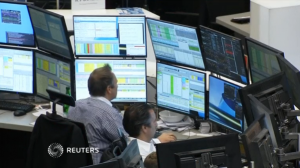

By Ciara Lee
(REUTERS) — The alarm bells rang in China – and they were heard in Europe.
Markets there opened more than three percent in the red
The UK’s FTSE 100, France’s CAC 40 and Germany’s DAX were all down in morning trade.
Robert Halver, head of Capital Market Analysis at Baader Bank said: “The 10,000 mark is psychologically important. The index is no longer five digit, it’s four digit and now we have entered a panic mode.”
The fall followed Chinese stocks which plunged more than eight percent in a session of panic selling.
Investors were disappointed that Beijing hadn’t offered any policy support after the country’s main indexes shed 11 percent last week.
Jeremy Cook, Chief Economist at World First, said this is a “very difficult phase for the Chinese economy.”
“Not because of what is going on elsewhere in the world but the rebalancing of the economy they are trying to make away from an industrial manufacturing economy to one which is more consumer driven. They are doing exactly what every western economy has done but at a much faster pace,” he explained.
Stock exchanges from Japan to Indonesia were hit hard as Chinese shares slid.
Commodity markets took a fresh battering.
Brent and U.S. crude oil futures hit 6-1/2-year lows as concerns about a global supply glut added to worries over potentially weaker demand from China.
And with serious doubts now emerging about the likelihood of a U.S. interest rate rise this year, the dollar slid against other major currencies.
The Australian dollar tanked to six-year lows and many emerging market currencies also plunged.
But a frantic dash to safety pushed the euro to a 6-1/2-month high.

